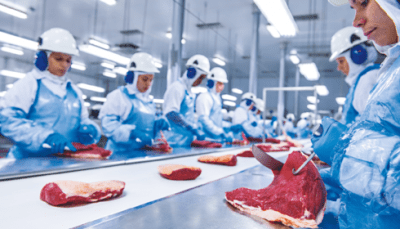Brazilian red meat processor Minerva has signed a non-binding memorandum of understanding with Saudi investor, the Saudi Agricultural and Livestock Investment Company (SALIC) aimed at the possible acquisition of processing assets in Australia and the formation of a joint venture focussed on breeding, farming, processing and exporting sheep and cattle.
Beef Central broke the news about Minerva’s intentions in Australia in this article last September.
 Last week Minerva Foods approved the signing of a contract governing the sale, supply and exports of goods produced and sold by the company to SALIC, in the capacity of supplier, and Salic (UK) in the capacity of buyer.
Last week Minerva Foods approved the signing of a contract governing the sale, supply and exports of goods produced and sold by the company to SALIC, in the capacity of supplier, and Salic (UK) in the capacity of buyer.
Minerva said that with SALIC’s support, the supply contract should strengthen Minerva Foods’ exposure and operations in the Middle East and Asia, which comprise around 65pc of the world’s population and 40pc of global GDP.
According to the US Department of Agriculture, these markets accounted for more than 60pc of global beef imports in 2020. In the three first quarters of 2020, the region was the destination of around 55pc of Minerva Foods’ beef exports.
Under the Supply Contract, SALIC may acquire up to 25,000 tonnes of Minerva’s products per year, at market prices in accordance with pre-defined terms and procedures, a statement said.
Minerva Foods also signed a non-binding memorandum of understanding with SALIC, aimed at the possible acquisition of assets in Australia and the formation of a joint venture focused on breeding, farming, processing and exporting sheep and cattle in that country.
“Australia is the world’s leading exporter of sheep meat processed products and the second largest exporter of beef. It is recognised worldwide for the tradition and quality of its products, accessing both high-growth markets, such as Asia and the Middle East, and markets with high income levels that enable high profitability, such as the US, Europe, Japan and South Korea, among others,”, Minerva said.
“The company believes that Australia uniquely complements our operations in South America, maximising sales opportunities and operating synergies, reducing risks and contributing to our strategy of consolidation in the animal protein export market.”
Minerva said that with the potential creation of the joint venture in partnership with SALIC, it is seeking to maximise new business opportunities, in order to meet the growing global demand for animal protein.
SALIC Australia’s wholly owned subsidiary Merredin Farms is the local farming entity that produces high quality crops and livestock products. It controls Australian farming and grazing assets totalling 211,000 ha. The land portfolio includes 158,000ha arable land of which just over 90,000 ha are cropped in the current season.
In addition, the business runs about 40,000 Merino sheep. SALIC UK is the Group’s wholly owned subsidiary based in London, established in 2014 to facilitate SALIC’s investments in new overseas ventures. It oversees SALIC’s investment fund management activities in the UK, acting as a holding company for investments in Europe, North America and other regions.
About SALIC
The Saudi Agricultural and Livestock Investment Company (SALIC) is a Saudi joint stock company owned by the nation’s Public Investment Fund, focused on agricultural investment and livestock production in countries with comparative advantages, in order to contribute to the achievement of food security and the provision of food products and price stability in Saudi.
